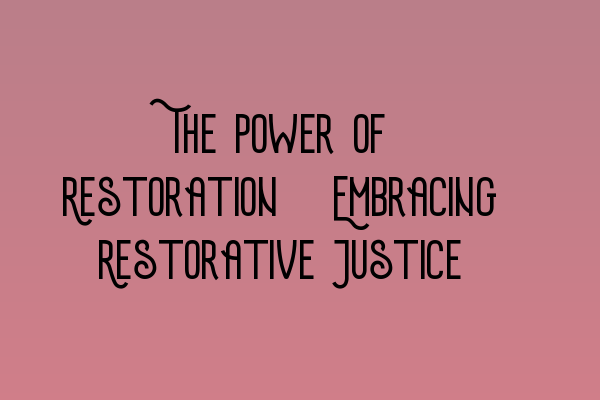The Power of Restoration: Embracing Restorative Justice
In today’s criminal justice system, there is a growing recognition of the importance of not only punishing offenders but also restoring balance and healing the harm caused to victims and communities. This shift in focus has led to the rise of restorative justice, a transformative approach that promotes dialogue, accountability, and rehabilitation. In this article, we will explore the power of restoration and why embracing restorative justice is crucial for a just and compassionate society.
What is Restorative Justice?
Restorative justice is an alternative to traditional punitive measures that aims to repair the harm caused by criminal behavior. It brings together victims, offenders, and the community in a facilitated process that encourages open communication, empathy, and understanding. The primary goal of restorative justice is to address the needs of all parties involved, promote healing, and prevent future harm.
Unlike the conventional criminal justice system, which focuses on punishment and isolation, restorative justice seeks to repair relationships, hold offenders accountable, and reintegrate them into society. It recognizes that crime impacts not only the immediate victims but also the wider community, and aims to rebuild trust and social cohesion.
The Key Principles of Restorative Justice
Restorative justice is grounded in several key principles that guide its application:
- Inclusion: All stakeholders affected by the crime, including victims, offenders, and community members, are actively involved in the restorative process. Their perspectives and needs are heard and respected.
- Responsibility: Offenders are encouraged to take responsibility for their actions and make amends. They are given the opportunity to understand the consequences of their behavior and take steps towards positive change.
- Repair: The focus is on repairing the harm caused by the offense. This may involve restitution, community service, or other forms of making things right.
- Reintegration: Restorative justice aims to reintegrate offenders into society as productive and responsible citizens. It provides them with support and resources to address the underlying causes of their behavior and break the cycle of crime.
- Collaboration: The process emphasizes collaboration and consensus-building. It seeks to create a safe and supportive space for open dialogue, empathy, and understanding.
The Benefits of Restorative Justice
Restorative justice offers numerous benefits compared to traditional punitive approaches. These benefits include:
- Victim Empowerment: Restorative justice gives victims a voice and allows them to express their feelings, needs, and desires. It empowers them by involving them directly in the decision-making process and helps them find closure and healing.
- Offender Accountability: Restorative justice holds offenders directly accountable for their actions, making them confront the consequences of their behavior. Through dialogue and reflection, they are encouraged to understand the impact of their actions and take steps towards personal growth and rehabilitation.
- Community Healing and Reintegration: By involving the community in the restorative process, restorative justice rebuilds trust, fosters empathy, and strengthens social bonds. It promotes a sense of collective responsibility and resilience, making communities safer and more cohesive.
- Reduced Recidivism: Studies have shown that restorative justice programs have lower recidivism rates compared to traditional punitive measures. By addressing the underlying causes of criminal behavior and providing support for rehabilitation, restorative justice helps break the cycle of crime.
Embracing Restorative Justice: The Path Forward
As legal professionals, it is our duty to promote justice and advocate for a system that values empathy, healing, and transformation. By embracing restorative justice and advocating for its implementation, we contribute to the creation of a more compassionate and effective criminal justice system.
If you are interested in learning more about criminal law and practice, we recommend checking out our related articles:
- SQE 1 Practice Exam Questions
- SQE 1 Practice Mocks FLK1 FLK2
- SQE 2 Preparation Courses
- SQE 1 Preparation Courses
- SRA SQE Exam Dates
By exploring these resources, you can deepen your understanding of criminal law and the SQE exams, ensuring you are well-prepared for a successful legal career.
At SQE Criminal Law & Practice Law UK, we are committed to providing comprehensive legal education and training to aspiring legal professionals. Contact us today to learn more about our SQE preparation courses and take the first steps towards a fulfilling career in criminal law.
